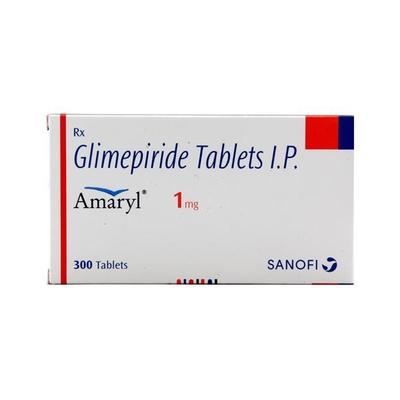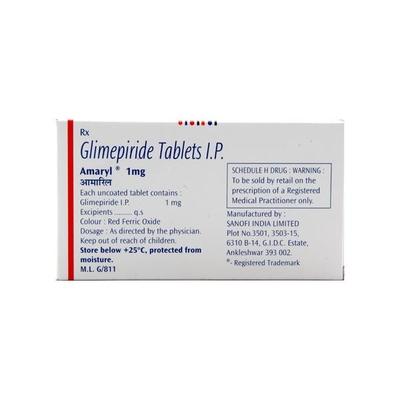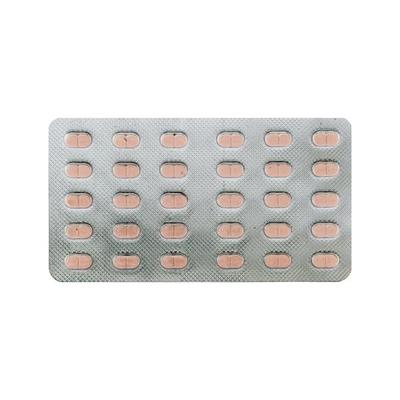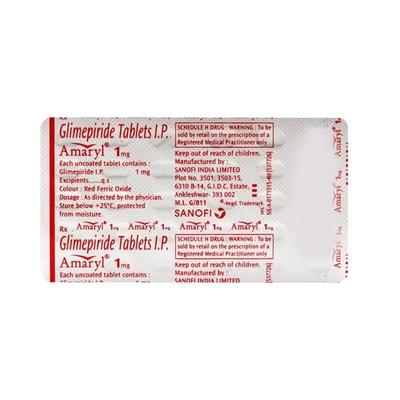

Netmeds First Membership
Quick Links
Introduction About AMARYL 1MG TABLET
AMARYL 1MG TABLET is used for Type II diabetes mellitus when diet and exercise alone does not result in adequate blood sugar control. It contains Glimepiride which is an Anti-diabetic agents.
It stimulates the pancreas to secrete more insulin (a hormone involved in glucose metabolism). It also makes our body more sensitive to insulin which helps in digesting the circulating sugars (glucose) in the blood, thereby reducing blood sugar levels.
Your doctor might ask you to make certain lifestyle changes such as following a healthy diet, regular physical exercise and quitting alcohol consumption. Before taking the medicine, inform your doctor if you have any liver or kidney problems, hormonal problems, genetic disorders (such as G6PD deficiency) or if you are malnourished, starved, on an irregular diet. AMARYL 1MG TABLET is not suitable for use in patients with type I diabetes mellitus. Consult your doctor if you are pregnant or planning to become pregnant or breastfeeding.
Common side effect of taking AMARYL 1MG TABLET is hypoglycemia (low blood sugar levels) which can be identified through symptoms such as increased hunger, sweating, shakiness, weakness or an irregular heartbeat.
Key Composition
- Glimepiride 1mg
- Form: Oral tablet
Uses Of AMARYL 1MG TABLET
- Manages Type II diabetes mellitus
Benefits of AMARYL 1MG TABLET
- Helps control blood sugar levels effectively in adults with type 2 diabetes.
- Stimulates the pancreas to release more insulin, improving glycemic control.
- Can reduce the risk of long-term diabetes-related complications such as nerve damage, kidney issues, and vision problems.
- Often used alongside diet and exercise to better manage blood glucose levels.
- Can help lower the need for additional diabetes medications when taken as prescribed.
- Supports maintaining a more balanced and healthy lifestyle for people with type 2 diabetes.
- Easy once-daily oral tablet that fits into daily diabetes care routines.
How AMARYL 1MG TABLET Works
The mechanism of action of AMARYL (glimepiride) primarily involves stimulating the release of insulin from functioning pancreatic beta cells. Glimepiride belongs to the sulfonylurea class and works by blocking ATP-sensitive potassium channels on the cell membranes of pancreatic beta cells. This blockage causes the cells to depolarize, which opens voltage-dependent calcium channels, allowing calcium influx. The increased intracellular calcium prompts exocytosis of insulin-containing granules, thereby increasing insulin secretion.
Additionally, glimepiride may enhance the sensitivity of peripheral tissues to insulin, promoting glucose uptake into cells. This dual action helps lower blood glucose levels in adults with type 2 diabetes. The medication is absorbed completely within an hour after oral administration, with peak blood levels reached around 2 to 3 hours post-dose.
It is typically effective in patients who have residual pancreatic beta-cell function and is used both as monotherapy and in combination with other glucose-lowering agents.
How to use AMARYL 1MG TABLET
- Take the tablet once daily with your first substantial meal of the day, usually breakfast.
- Swallow the tablet whole with a glass of water; do not chew, break, or cut it.
- Taking it with food helps reduce the risk of low blood sugar (hypoglycemia).
- Maintain a consistent routine by taking it at approximately the same time each day.
- Never take the tablet on an empty stomach or if you are fasting.
Recommended Dosage for AMARYL 1MG
- The usual starting dose is 1 mg or 2 mg once daily.
- Your doctor may adjust the dose gradually every 1 to 2 weeks based on blood sugar monitoring.
- Typical maintenance doses range from 1 mg to 4 mg per day.
- The maximum recommended dose is 8 mg per day.
- Dosage adjustments consider factors such as age, kidney function, other medications, and diabetes severity.
When and How to Take AMARYL 1MG Tablet
- Take with your first main meal to coincide with rises in blood sugar.
- If you miss breakfast, take it with your next substantial meal.
- Avoid missing doses to maintain stable blood glucose control.
- If you are ill or fasting, consult your doctor before taking the dose.
What if I forgot to take AMARYL 1MG TABLET
- If a dose is missed, take it as soon as you remember.
- If it is almost time for your next dose, skip the missed dose—do not double up.
- Taking a double dose can cause dangerously low blood sugar.
- Use reminders, alarms, or apps to help keep dosing consistent.
Overdose
- If you or anyone else accidentally took more of AMARYL 1MG TABLET, you may experience the signs of hypoglycemia (such as increased hunger, sweating, headache, feeling clammy, restless or aggressive, shakiness, fast heartbeat and confusion). To manage this, consume any sugary food immediately. If the symptom did not improve or worsens contact your doctor immediately.
Side Effects Of AMARYL 1MG TABLET
Common side effects
- hypoglycemia (low blood sugar levels)
When to consult a doctor?
- severe allergic reaction (inflammation of blood vessels, skin rash, swelling of the face, eyelids, lips, tongue or throat which causes difficulty in breathing or swallowing, drop in blood pressure)
- signs of liver problems (such as fever, yellowing of skin and whites of the eyes, weakness, fatigue, weight loss and loss of appetite)
- increased skin sensitivity to sun
- signs of severe decrease in blood sugar level (such as confusion, headache, excessive sweating, clammy skin, trembling, weakness, double vision, excessive hunger, nausea, vomiting, problems in sleeping, feeling agitated)
Precautions to Minimize Side Effects of AMARYL 1MG TABLET
- Monitor Blood Sugar Regularly
Frequent blood glucose checks help detect low blood sugar (hypoglycemia) early, enabling timely correction. - Be Alert for Hypoglycemia Symptoms
Know warning signs like dizziness, headache, sweating, shakiness, confusion, or hunger. Carry fast-acting glucose sources (e.g., glucose tablets) for emergencies. - Take with Food
Always take AMARYL with your first substantial meal to reduce the risk of hypoglycemia. - Avoid Alcohol
Alcohol can increase hypoglycemia risk and affect blood sugar control. Limit or avoid alcohol during treatment. - Inform Doctors About Other Medications
Some drugs (e.g., certain antibiotics, steroids, diuretics) can affect blood sugar or interact with AMARYL, increasing side effect risks. - Dose Adjustments for Special Population
Elderly, kidney or liver impaired patients require careful dosing and close monitoring to prevent side effects. - Report Any Allergic Reactions Immediately
Discontinue and seek urgent care if symptoms like rash, swelling, difficulty breathing, or severe dizziness occur. - Avoid Sudden Dose Changes
Do not stop or modify the dose without consulting your healthcare provider. - Manage Physical Activity and Diet
Avoid excessive or prolonged exercise without adjusting food and medication intake to prevent hypoglycemia. - Keep Emergency Contacts Ready
If severe hypoglycemia occurs causing loss of consciousness or seizures, emergency medical assistance is necessary.
Warning & Precautions
Pregnancy
Monitoring requiredThere are no adequate and well-controlled studies in pregnant women. AMARYL 1MG TABLET should be used during pregnancy only if the potential benefit justifies the potential risk to the fetus.
Breastfeeding
Consult your doctorIt is not known whether AMARYL 1MG TABLET is excreted in human milk. Consult your doctor for advice.
Driving and Using Machines
Use with CautionDo not drive or operate any heavy tools or machines if your ability is affected by the medicine.
Alcohol
Consult your doctorAvoid consumption of alcohol while taking AMARYL 1MG TABLET as it may increase the risk of unwanted side effects.
Kidney
Consult your doctorAMARYL 1MG TABLET is not recommended for use in patients with severe kidney problems. It should be used with caution in patients with other kidney problems.
Liver
Consult your doctorAMARYL 1MG TABLET is not recommended for use in patients with severe liver problems. It should be used with caution in patients with other liver problems.
Allergy
ContraindicatedDo not take AMARYL 1MG TABLET if you are allergic to Glimepiride or any other ingredients of this medicine.
Use In Pediatrics
ContraindicatedAMARYL 1MG TABLET is not recommended in pediatric patients because of its adverse effects on body weight and hypoglycemia.
Use In Geriatrics
Use with CautionAMARYL 1MG TABLET should be used with caution in elderly patients (aged above 65 years).
Other Warnings for AMARYL 1MG TABLET
Before taking AMARYL 1MG TABLET , inform your doctor if you:
- are recovering from any injury, operation, infections or from any form of stress
- have G6PD deficiency
- have sugar intolerance
- are malnourished, starved, on an irregular diet, or feeling weak
- had made any sudden changes to diet
- are on fasting
- perform extreme physical exercises without proper carbohydrate intake
- have hormonal problems (Ex. disorders of pituitary gland, adrenal cortex or thyroid gland)
Who should not take AMARYL 1MG TABLET
AMARYL 1MG TABLET is not recommended for use if you:
- have type I diabetes mellitus
- have diabetic ketoacidosis
Diet and Lifestyle Advice
- Adopt a Balanced Diet
Focus on whole grains, fresh vegetables, fruits (in moderation), lean proteins, and healthy fats. Avoid excessive sugar, refined carbs, and processed foods. - Control Portion Sizes
Eating smaller, frequent meals helps maintain stable blood sugar levels. - Limit Sugary and High-Glycemic Foods
Reduce intake of sweets, sugary drinks, white bread, and bakery products that can cause rapid blood sugar spikes. - Stay Hydrated
Drink plenty of water throughout the day to support overall metabolic health. - Engage in Regular Physical Activity
Aim for at least 30 minutes of moderate exercise daily, like walking, cycling, or swimming, after consulting your healthcare provider. - Maintain a Healthy Weight
Losing excess weight improves insulin sensitivity and blood sugar control. - Avoid Alcohol or Consume Moderately
Alcohol can affect blood sugar; discuss safe limits with your doctor. - Manage Stress Effectively
Practice relaxation techniques such as deep breathing, meditation, or yoga to reduce blood sugar fluctuations caused by stress. - Get Adequate Sleep
Aim for 7-8 hours of restful sleep nightly to support metabolic balance. - Coordinate with Medications
Follow medication timings and dosage as prescribed by healthcare professionals to complement diet and lifestyle efforts.
Drug - Drug interaction
- Increased Risk of Hypoglycemia: Certain drugs can increase the blood sugar-lowering effect of AMARYL, raising the risk of low blood sugar (hypoglycemia). These include:
- Nonsteroidal anti-inflammatory drugs (NSAIDs)
- Certain antibiotics like clarithromycin and fluconazole
- Beta-blockers such as propranolol
- Alcohol (especially in excess)
- Some blood pressure medicines like ACE inhibitors
- Reduced Effectiveness: Some drugs may reduce the blood sugar control effect of AMARYL, potentially causing high blood sugar, such as:
- Rifampin (a tuberculosis medicine)
- Phenytoin (used for seizures)
- Corticosteroids
- Diuretics (water pills)
- Thyroid medications
- Oral contraceptives and estrogens
- Specific Interactions to Note
- Colesevelam (cholesterol medicine) can reduce AMARYL absorption if taken simultaneously; take AMARYL at least 4 hours before colesevelam.
- Aspirin in high doses may decrease AMARYL levels, but typically no significant clinical effect.
- Cimetidine and ranitidine (used for stomach acid) do not significantly affect AMARYL.
- Monitoring and Precautions: Always inform your doctor and pharmacist about all medications, supplements, and herbal products you use. Your healthcare provider may adjust doses or monitor blood sugar more closely when AMARYL is combined with interacting drugs.
Synopsis
| Drug | : | Glimepiride |
| Pharmacological Category | : | Sulfonylureas |
| Therapeutic Indication | : | Type 2 diabetes mellitus |
| Dosage Forms | : | Tablet |
More Information
Did you know?
- Glimepiride is often called a third-generation sulfonylurea due to its improved efficacy and safety profile compared to older drugs in its class.
- It was FDA-approved in 1995 and has since been widely used for managing type 2 diabetes when diet and exercise alone are insufficient.
- Unlike some other diabetes medicines, AMARYL allows for once-daily dosing, making it more convenient for patients.
- Clinical studies show that it can significantly reduce HbA1c (long-term blood sugar marker) by about 2% when taken as prescribed.
- AMARYL’s effect lasts for about 24 hours after a single dose, helping maintain consistent blood sugar control.
- Patients with kidney impairment may require dose adjustments, as glimepiride and its metabolites are partially cleared through the kidneys.
- It should always be taken with a meal to reduce the risk of low blood sugar (hypoglycemia).
- AMARYL can be combined with other antidiabetic agents like metformin to provide a synergistic effect on blood sugar control.
Comparison with similar medicines
|
Feature/Aspect |
AMARYL 1MG (Glimepiride) |
Metformin |
Glipizide |
Pioglitazone |
|
Drug Class |
Sulfonylurea |
Biguanide |
Sulfonylurea |
Thiazolidinedione |
|
Mechanism of Action |
Stimulates insulin release from pancreas |
Decreases glucose production in the liver |
Stimulates insulin release |
Improves insulin sensitivity |
|
Typical Dosing |
1-8 mg once daily |
500-2000 mg daily, divided doses |
5-20 mg daily (usually twice daily) |
15-45 mg once daily |
|
Usage |
Type 2 diabetes, often second-line or add-on |
First-line for type 2 diabetes |
Type 2 diabetes |
Type 2 diabetes, especially with insulin resistance |
|
Side Effects |
Hypoglycemia, weight gain, nausea |
Gastrointestinal upset, vitamin B12 deficiency |
Hypoglycemia, weight gain |
Weight gain, edema, risk of heart failure |
|
Renal Impairment Use |
Dose adjustment needed in renal impairment |
Use with caution if renal function impaired |
Adjust dose or avoid depending on severity |
Typically avoided if heart failure present |
|
Onset & Duration |
Onset within 1-2 hours, duration up to 24 hours |
Onset slower, effects accumulate over days |
Onset 1-2 hours, duration ~12-24 hours |
Slower onset, effects develop over weeks |
|
Cost |
Moderate |
Generally low cost |
Moderate |
Higher than sulfonylureas and metformin |
Tips to monitor blood sugar level
- Use a Reliable Glucometer
Choose a quality blood glucose meter approved by health authorities. Follow the manufacturer’s instructions for accurate readings. - Test at Recommended Times
Common testing times include fasting (before breakfast), 2 hours after meals, before exercise, and at bedtime. Follow your healthcare provider’s schedule. - Keep a Logbook or Digital Record
Record all readings with date, time, and notes on meals, activity, or symptoms to detect patterns. - Follow Proper Testing Technique
Wash hands before testing to avoid contamination. Use fresh test strips and change lancets regularly for comfort and accuracy. - Understand Your Target Levels
Know your personal target glucose ranges as advised by your doctor or diabetes educator. - Look for Trends, Not Just Single Readings
Patterns over days or weeks help guide treatment decisions more than individual values. - Adjust Lifestyle Accordingly
Use your readings to inform dietary choices, physical activity, and medication timing, always in consultation with your healthcare provider. - Report Abnormal Results Promptly
Very high or low readings should be discussed with your doctor immediately to prevent complications. - Avoid Testing Stress
Stay calm during tests, and don’t let occasional irregular readings discourage you. - Schedule Regular Reviews
Share your logs during medical visits to optimize your diabetes management plan.
FAQs About AMARYL 1MG TABLET
Q: What is AMARYL 1MG TABLET used for?
A: AMARYL 1MG TABLET is an antidiabetic medicine used to manage Type II diabetes mellitus when diet, exercise and lifestyle changes alone does not result in adequate response.
Q: How and when to take AMARYL 1MG TABLET?
A: Take AMARYL 1MG TABLET preferably after meals or as advised by your physician. Swallow the medicine with a glass of water. Do not crush or chew the medicine. Your doctor will decide the correct dose and duration of therapy for you depending upon your age, body weight and disease condition.
Q: How long should I take AMARYL 1MG TABLET?
A: You need to take AMARYL 1MG TABLET as long as your doctor or physician prescribes you the medicine.
Q: What is the best time to take AMARYL 1MG TABLET?
A: AMARYL 1MG TABLET must be taken with meals to avoid gastrointestinal side effects. Consult your doctor for advice.
Q: What to do if I forgot to take a dose of AMARYL 1MG TABLET?
A: If you forgot to take a dose of AMARYL 1MG TABLET, take it as soon as you remember. However, if it is time for the next dose of AMARYL 1MG TABLET, skip the missed dose and take the next one regularly. Do not take a double dose to compensate the missed ones.
Q: What are the most common side effects of taking AMARYL 1MG TABLET?
A: The most common side effects of taking AMARYL 1MG TABLET is hypoglycemia. To avoid this, your doctor will periodically monitor your blood sugar levels and adjust the dose accordingly. You can also carry a sugary snack (such as biscuits, glucose drinks or sweet candies) along with you as a precaution and have them immediately if you experience any signs of hypoglycemia.
Q: Can I stop taking AMARYL 1MG TABLET without consulting your doctor?
A: No. You should not stop taking AMARYL 1MG TABLET without consulting your doctor because it may lead to reversal of symptoms. If you feel better after using AMARYL 1MG TABLET, consult your doctor for advice.
Q: Will taking a higher dose of AMARYL 1MG TABLET be more effective?
A: No, taking a higher dose of AMARYL 1MG TABLET will not be effective rather it can lead to unwanted side effects. Always take the dose prescribed by your doctor. If the prescribed dose is not effective for you, consult your doctor for advice. Your doctor might increase the dose or suggest an alternative therapy.
Q: What precautions do I need to follow while taking AMARYL 1MG TABLET?
A: Before taking AMARYL 1MG TABLET, inform your doctor if you have any liver or kidney problems. You must also inform your doctor if you have hormonal problems, genetic problems (surgery in the gut) or if you are malnourished. It is not suitable for use in patients with type I diabetes mellitus.
Q: Can I take medication for high blood pressure along with AMARYL 1MG TABLET?
A: It is not advisable to take medicines to control blood pressure while taking AMARYL 1MG TABLET without consulting your doctor. Therefore, consult your doctor before taking any antihypertensive such as beta blockers (Ex. atenolol, propranolol) along with the medicine as they have known interactions with the medicine.
Q: What should I do if I experience low blood sugar after taking AMARYL 1MG TABLET?
A: Low blood sugar is a common side effect of taking AMARYL 1MG TABLET. Try to have sugar rich food items such as fruit juice, glucose tablets or gel, soft drinks, honey or sugary candy. Check your blood sugar after 10 minutes. If you have not gained optimum level, take another sugary snack, or drink, and check the blood sugar levels once again. In case of persistent low blood sugar levels, consult your doctor immediately.
Q: Can AMARYL 1MG TABLET be taken with insulin?
A: Co-administration of AMARYL 1MG TABLET with insulin is considered risky as they are increased chances of hypoglycemia (decreased blood sugar levels).
References
1. KD. Tripathi. Insulin, Oral Hypoglycaemic Drugs and Glucagon. Essentials of medical pharmacology. Seventh edition. 2013. Page – 270.
2. Abdul Basit, Musarrat Riaz and Asher Fawwad. Glimepiride: evidence-based facts, trends, and observations. NIH. National Library of Medicine. National Center for Biotechnology Information. PMC. PubMed Central. August 2012. [Accessed on 5th September 2025] ![]()
3. Brown & Burk UK Limited. Electronic Medicines Compendium (EMC). [Revised in December 2020] [Accessed on 5th September 2025] 
4. Sanofi India Limited. Amaryl® / Semi-Amaryl® Glimepiride Tablets IP. [Revised in April 2021] [Accessed on 5th September 2025] 











